You’re standing at your front door, fumbling for keys while juggling groceries, and thinking there’s got to be a better way. Smart door locks promise convenience, but you’re faced with an essential decision: Bluetooth or WiFi connectivity. Each technology offers distinct advantages that’ll impact your daily routine, security, and wallet. The choice isn’t as straightforward as you might expect, and making the wrong decision could leave you locked out of features you didn’t know you needed.
Understanding Bluetooth Smart Door Locks
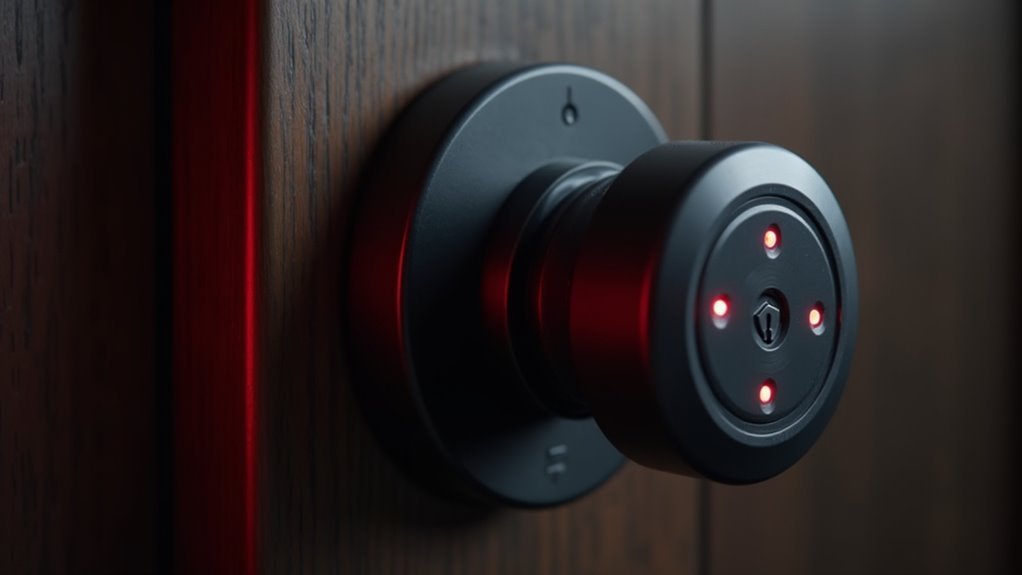
When you’re considering smart lock technology, Bluetooth options offer a streamlined approach to home security through short-range wireless communication.
These Bluetooth smart locks operate within a 25-foot range, automatically opening when your paired smartphone or key fob approaches. You’ll enjoy hands-free access that eliminates traditional keys while maintaining reliable operation.
Battery life proves superior to Wi-Fi alternatives, and you’ll benefit from continued functionality during power outages.
Bluetooth smart locks deliver extended battery performance and remain operational when your home loses electrical power.
The customizable access control lets you grant time-specific permissions, making property management effortless for family members or temporary visitors.
However, you should consider the remote access limitations. Since proximity is required for operation, you can’t open your door from distant locations, and dead device batteries could prevent entry entirely.
Key Benefits of Bluetooth Door Lock Technology
You’ll appreciate how Bluetooth door locks eliminate the hassle of fumbling for keys by automatically opening when your smartphone comes within 25 feet of your door.
These locks also deliver superior battery performance compared to Wi-Fi models, keeping your home secure even during power outages while reducing maintenance needs.
The combination of hands-free convenience and reliable power management makes Bluetooth technology particularly attractive for busy homeowners who want seamless access without constant upkeep.
Hands-Free Automatic Access
While traditional locks require you to fumble for keys or manually operate apps, Bluetooth door locks revolutionize entry with true hands-free convenience. Your smartphone automatically triggers the lock when you’re within 25 feet, eliminating the need to search through pockets or bags.
This automatic access system offers several practical advantages:
- Instant entry – The lock detects your paired device and releases before you reach the door
- Power outage protection – Battery-powered operation guarantees continuous access without internet dependency
- Customizable scheduling – Set time-specific access for guests, delivery personnel, or service providers
You’ll never need to manually interact with apps when approaching your home. The Bluetooth technology handles everything seamlessly, making your daily routine smoother and more efficient while maintaining security.
Extended Battery Performance
Bluetooth door locks deliver exceptional battery efficiency that’ll keep your home secure for up to twelve months on a single set of standard batteries.
Unlike Wi-Fi smart locks that constantly communicate with your home network, Bluetooth technology consumes considerably less power through its limited operational range of 25 feet. This proximity-based activation means your lock only engages when your paired device approaches, preserving battery life when you’re away.
You’ll maintain consistent access during power outages since these battery-powered locks don’t rely on external electricity.
The hands-free engaging feature reduces unnecessary battery drain by eliminating frequent app usage. Additionally, you can optimize power consumption through customizable access settings, scheduling specific unlocking times to limit active Bluetooth connectivity periods and maximize your lock’s operational lifespan.
Limitations of Bluetooth Smart Locks
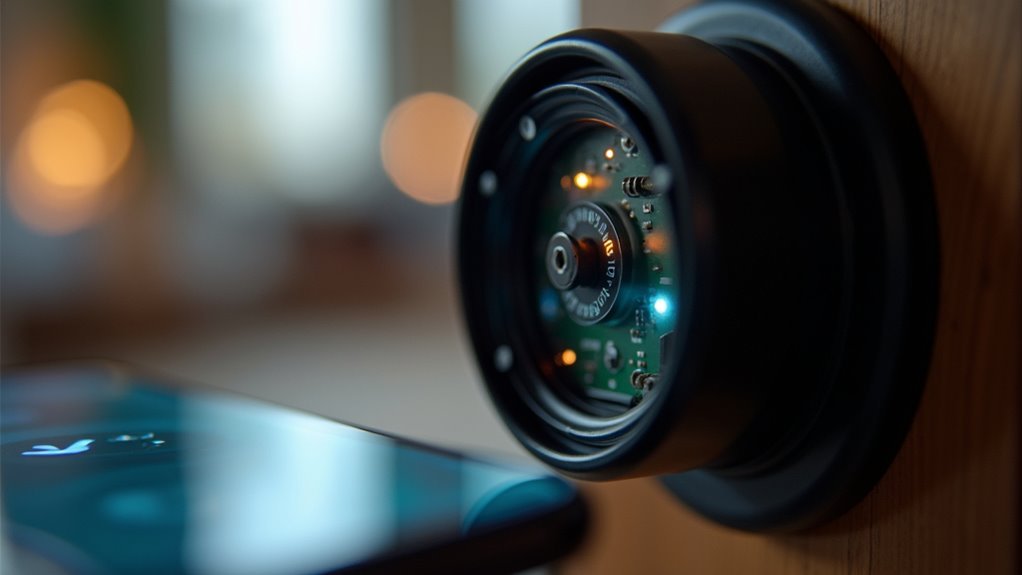
Despite their convenience and enhanced security features, Bluetooth smart locks come with several notable drawbacks that you should consider before making your purchase.
The most significant limitations include:
- Limited range and connectivity: You’ll face restricted remote access with only 25 feet of operational range, often requiring manual opening through your app when you’re out of range during emergencies.
- Increased battery drain: Continuous Bluetooth usage accelerates your smartphone’s battery drain, potentially leaving you locked out if your phone dies.
- Reduced functionality: You’ll miss out on advanced features like real-time alerts and remote monitoring that Wi-Fi locks provide, plus sharing digital keys requires smartphones for all users.
These Bluetooth smart locks limitations make them less suitable for users needing extensive remote access capabilities.
What Are WiFi Smart Door Locks
WiFi smart door locks connect directly to your home’s wireless internet network, giving you complete remote control from anywhere in the world through your smartphone app.
You’ll get seamless integration with popular smart home systems like Alexa and Google Assistant, plus real-time notifications whenever someone locks or opens your door.
However, these advanced features come with a dependency on stable internet connectivity that you’ll need to evaluate.
WiFi Connection Requirements
One major advantage of WiFi smart door locks is their ability to connect directly to your home’s internet network, giving you complete control over your door from virtually anywhere in the world.
Unlike Bluetooth options, Wi-Fi smart locks enable true remote locking capabilities through your mobile app, whether you’re at work or on vacation.
To maximize your lock’s performance, you’ll need:
- Stable internet connection – Consistent Wi-Fi signal strength at your door’s location
- Compatible mobile app – Downloaded and configured on your smartphone for full functionality
- Network security – Strong password protection for your home Wi-Fi network
Your Wi-Fi smart locks will send real-time alerts directly to your phone, notifying you instantly of any door activity.
However, remember that internet outages will temporarily disable remote features until your connection’s restored.
Remote Access Features
When you’re traveling across the country or simply at the office, Wi-Fi smart door locks transform how you control access to your home. Unlike Bluetooth smart locks that require close proximity, Wi-Fi smart locks offer true remote control from anywhere with internet connectivity.
You’ll receive instant notifications when someone enters or exits, maintaining constant awareness of your property’s security status.
These locks excel at creating temporary digital keys for guests, cleaners, or delivery personnel. You can set specific time restrictions and revoke access instantly when needed.
Integration with your voice assistant adds hands-free convenience for daily use. Advanced models include video monitoring and detailed activity logs, providing thorough oversight of all entry attempts and successful access events at your property.
Smart Home Integration
Beyond simple door control, Wi-Fi smart locks serve as central hubs that seamlessly integrate with your entire smart home ecosystem. Unlike Bluetooth smart locks that operate independently, Wi-Fi smart locks communicate directly with other smart home devices to create automated responses when you control access to your home.
This smart home integration enables sophisticated coordination:
- Lighting automation – Doors open and lights automatically turn on when you arrive home
- Security camera activation – Cameras begin recording when temporary digital keys are used by guests
- Voice assistant commands – Control access through Alexa or Google Assistant alongside other connected devices
Wi-Fi smart locks transform your entrance into an intelligent gateway that responds to your lifestyle, creating seamless experiences that Bluetooth alternatives simply can’t match in thorough home automation.
Advantages of WiFi-Enabled Door Locks
WiFi-enabled door locks transform your home security by offering unparalleled remote access capabilities that extend far beyond your property’s boundaries.
WiFi door locks revolutionize home security with remote access that reaches anywhere in the world.
You can access your door from anywhere globally with an active internet connection, making it perfect for letting in unexpected guests or service providers while you’re away.
Wi-Fi smart locks deliver real-time notifications whenever someone accesses your door, keeping you informed of any unauthorized attempts.
You’ll receive instant alerts on your smartphone, ensuring you’re always aware of your home’s security status.
These locks integrate seamlessly with smart home ecosystems, enabling voice control through Alexa and Google Assistant.
You can create temporary digital keys with expiration dates, eliminating the need for physical key exchanges.
Advanced features include activity logs and video monitoring for thorough oversight.
Drawbacks of WiFi Smart Lock Systems
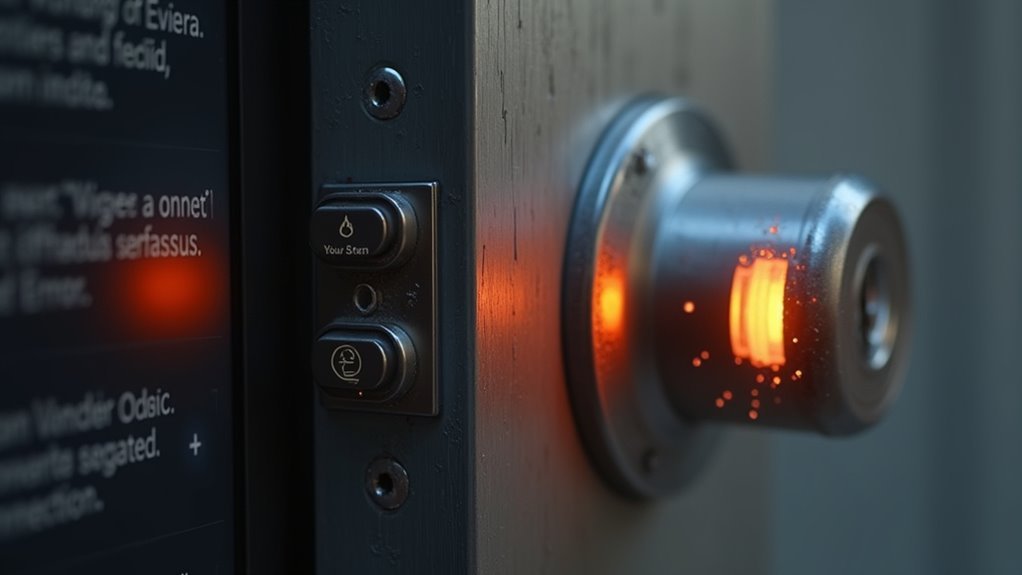
While Wi-Fi smart locks offer impressive remote capabilities, they come with notable limitations you’ll need to contemplate.
You’ll face frequent battery replacements since these locks consume considerably more power than their Bluetooth counterparts.
Most importantly, you’ll lose all functionality during internet outages or power failures, leaving you potentially locked out when you need access most.
Power Dependency Issues
Although WiFi smart locks offer impressive remote capabilities, they create a significant vulnerability through their heavy reliance on continuous power and internet connectivity. When power outages strike, your Wi-Fi smart locks may become completely inoperable unless equipped with battery backup systems, potentially leaving you locked out of your own home.
The power dependency issues extend beyond outages:
- Shorter battery life requires frequent replacements compared to Bluetooth locks, increasing maintenance costs.
- Internet connectivity failures can render remote access features useless during critical moments.
- Security risks multiply when your network becomes unstable, creating potential entry points for hackers.
Conversely, Bluetooth locks operate independently of internet connections, functioning locally even during power disruptions. They’ll continue working when your home’s connectivity fails, providing reliable access regardless of external infrastructure problems.
Higher Battery Drain
Beyond connectivity concerns, Wi-Fi smart locks impose a substantial financial burden through their voracious appetite for battery power. The higher battery drain stems from continuous internet connectivity required for remote control functionality. While Bluetooth locks conserve energy by activating only when you’re nearby, Wi-Fi smart locks constantly communicate with your network.
| Lock Type | Battery Life | Power Consumption | Replacement Frequency |
|---|---|---|---|
| Wi-Fi Smart Locks | 2-4 months | High (continuous connection) | 3-6 times yearly |
| Bluetooth Locks | 12+ months | Low (proximity-based) | Once yearly |
| Traditional Locks | N/A | None | Never |
You’ll find yourself replacing batteries frequently, especially if you heavily use real-time alerts and monitoring features. This constant maintenance creates operational interruptions and ongoing costs that greatly impact your lock’s total ownership expense compared to more efficient Bluetooth alternatives.
Internet Connectivity Requirements
Since Wi-Fi smart locks depend entirely on your internet connection for their core functionality, they’re inherently vulnerable to network disruptions that can leave you stranded. When your internet connectivity fails, you’ll lose remote access capabilities and must rely on physical key backups.
This dependency creates several challenges:
- Power outage vulnerability – You could find yourself locked out during electrical storms or utility failures.
- Poor service area limitations – Rural locations or areas with weak signals restrict functionality.
- Network instability risks – Unstable connections compromise security and expose unauthorized access opportunities.
Unlike Bluetooth locks that operate independently, Wi-Fi smart locks consume considerably more power maintaining constant internet connections, resulting in shorter battery life and frequent replacements.
You’ll need reliable backup plans since network-dependent systems can’t guarantee consistent access to your home.
Range and Connectivity Comparison
When choosing between Bluetooth and WiFi door locks, you’ll find that range capabilities create the most significant operational difference between these technologies.
Bluetooth range limits you to approximately 25 feet, requiring your smartphone or key fob nearby for opening. This proximity requirement can cause connectivity issues if you’re outside the effective range when approaching your door.
Wi-Fi locks eliminate distance barriers entirely, offering true remote access from anywhere with internet connectivity. You can open your door from across the globe, making them ideal for managing guest access or emergency situations.
However, Bluetooth’s limited range delivers superior battery life since it consumes less power than Wi-Fi’s constant internet connection.
Wi-Fi locks drain batteries faster due to their continuous connectivity demands, requiring more frequent battery replacements.
Battery Life and Power Consumption
You’ll notice a significant difference in battery performance between Bluetooth and Wi-Fi smart locks.
Bluetooth models typically last several months to a year on a single battery charge, while Wi-Fi locks drain power much faster due to their constant internet connection.
This means you’ll replace batteries in Wi-Fi locks every 2-3 months compared to the less frequent replacements needed for Bluetooth versions.
Bluetooth Battery Longevity
While WiFi smart locks offer impressive connectivity features, Bluetooth models excel in battery efficiency, typically delivering up to a year of operation on a single set of batteries.
Bluetooth smart locks achieve superior battery life through their energy efficiency design, activating only when you’re in close proximity rather than maintaining constant connectivity.
The power consumption advantages of Bluetooth technology translate into practical benefits:
- Extended operation periods – Most models run for six months to a year before requiring battery replacement
- Power outage reliability – Battery-powered options guarantee lock functionality during electrical outages
- Reduced maintenance – Lower energy consumption means fewer battery changes and ongoing costs
Your smartphone might drain faster with continuous Bluetooth usage, but the locks themselves minimize power consumption, making them ideal for users prioritizing long-term reliability and reduced maintenance requirements.
WiFi Power Drain
Although WiFi smart locks provide impressive remote access capabilities, they sacrifice battery life for enhanced connectivity features. You’ll find these locks consume considerably more power due to constant internet connectivity and real-time monitoring functions.
| Lock Type | Battery Life | Power Consumption |
|---|---|---|
| WiFi Smart Locks | 2-3 months | High |
| WiFi (heavy usage) | 3-6 months | Very High |
| Bluetooth Smart Locks | 6+ months | Low |
| WiFi (basic features) | 4-6 months | Medium |
| Bluetooth (standard) | 8-12 months | Very Low |
Wi-Fi smart locks typically require battery replacements every few months, while Bluetooth smart locks can exceed six months easily. You’ll need backup power solutions or physical keys during outages, making WiFi locks less reliable during power failures compared to their Bluetooth counterparts.
Battery Replacement Frequency
Smart lock battery replacement schedules directly impact your long-term maintenance costs and convenience. Understanding the battery replacement frequency between Bluetooth smart locks and Wi-Fi smart locks helps you make an informed decision.
Bluetooth smart locks offer superior battery life, typically lasting several months to a full year due to their lower power consumption and limited operational range. In contrast, Wi-Fi smart locks require more frequent battery changes every 2-3 months because of constant internet connectivity demands.
Key factors affecting replacement schedules include:
- Usage frequency and automated features like auto-unlock
- Real-time notifications and connectivity requirements
- Battery-saving modes that reduce power consumption
You’ll want to monitor your lock’s battery life indicator to avoid getting locked out and consider models with energy-efficient features.
Security Features and Vulnerabilities
When evaluating smart lock technologies, security remains the paramount concern that determines whether your investment protects or compromises your home.
Bluetooth smart locks offer enhanced security through proximity-based authentication, requiring your device within 25 feet for keyless entry, considerably reducing remote hacking risks. However, continuous Bluetooth usage drains smartphone batteries, potentially leaving you locked out if your device dies.
Wi-Fi smart locks rely on internet connections for remote access and real-time alerts, making them vulnerable to online attacks without proper security measures. While they enable convenient temporary digital keys for guests, improper key management creates security risks.
Both technologies face security vulnerabilities requiring regular firmware updates to patch potential breaches, making consistent software maintenance essential for protecting your home.
Installation Requirements and Complexity
Two distinct installation paths emerge when choosing between Bluetooth and Wi-Fi smart locks, each presenting different complexity levels that can make or break your DIY experience.
Bluetooth locks typically offer the simpler route, often retrofitting your existing deadbolt without extensive hardware changes. This makes them perfect for renters who can’t make permanent modifications.
Wi-Fi smart locks present greater setup complexity, requiring stable internet connections and network integration that can involve troubleshooting connectivity issues.
Key installation considerations include:
- Hardware compatibility – Check if your lock fits standard pre-drilled holes
- Technical requirements – Some advanced models need complete old lock removal and drilling
- Setup support – Bluetooth apps usually provide better installation guidance than Wi-Fi counterparts
Most smart locks accommodate standard door preparations, but always verify compatibility beforehand.
Cost Analysis: Bluetooth Vs Wifi Models
Beyond installation complexity, your budget plays an essential role in determining which smart lock technology delivers the best value for your specific needs. When conducting a cost analysis, Bluetooth smart locks typically offer lower upfront costs ranging from $100-$200, while Wi-Fi smart locks can exceed $300. However, your overall cost of ownership extends beyond initial purchase price.
| Cost Factor | Bluetooth | Wi-Fi |
|---|---|---|
| Upfront Price | $100-$200 | $150-$300+ |
| Battery Life | 12+ months | 2-3 months |
| Internet Fees | None | Required |
| Subscriptions | Minimal | Often needed |
Battery life greatly impacts long-term expenses. Bluetooth models last over a year, while Wi-Fi versions require frequent replacements. Additionally, Wi-Fi smart locks demand stable internet connections and potential subscription fees for monitoring services, making Bluetooth options more economical long-term.
Smart Home Integration Capabilities
Modern smart home ecosystems demand seamless connectivity between devices, and your choice of lock technology directly impacts integration possibilities.
Wi-Fi smart locks excel at connecting with major smart home platforms, offering thorough automation capabilities:
- Voice assistant compatibility – Works with Amazon Alexa, Google Assistant, and Apple HomeKit for hands-free operation
- Multi-device synchronization – Integrates with security cameras, lighting systems, and other connected devices
- Advanced automation scenarios – Triggers coordinated responses when you open your door
Bluetooth smart locks provide more limited integration options, primarily focusing on smartphone app control within 25 feet.
While they offer reliable basic functions, they can’t match Wi-Fi models’ advanced features like remote access from anywhere or complex automation routines.
Hybrid models combining both technologies give you maximum flexibility across different smart home platforms.
Which Door Lock Type Fits Your Lifestyle
Understanding how each technology integrates with your smart home setup is just one piece of the puzzle – your daily routines and living situation ultimately determine which lock type serves you best.
If you’re primarily home and want hassle-free entry within 25 feet, Bluetooth smart locks offer excellent convenience with superior battery life due to lower power consumption.
You’ll appreciate minimal maintenance and reliable everyday access.
However, if you travel frequently, manage rental properties, or need to grant guest access remotely, Wi-Fi smart locks provide the flexibility you need.
Remote access from anywhere with internet connection makes monitoring and controlling your lock effortless, despite shorter battery life.
Consider your priorities: choose Bluetooth for simplicity and longevity, or Wi-Fi for advanced functionality and remote capabilities.
Hybrid Options: Best of Both Technologies
When you can’t decide between Bluetooth’s simplicity and Wi-Fi’s remote capabilities, hybrid smart locks eliminate the need to choose. These innovative devices combine both technologies, giving you proximity access through Bluetooth while maintaining remote capabilities via Wi-Fi connectivity.
Hybrid options deliver thorough functionality that adapts to your daily routine:
- Hands-free convenience – Access automatically when you’re within Bluetooth range, then control remotely when you’re away
- Extended battery life – Enjoy Bluetooth’s energy efficiency while accessing Wi-Fi’s advanced features
- Real-time monitoring – Receive instant alerts and notifications wherever you have internet connection
Devices like Lockly’s Secure Link WiFi Hub retrofit existing Bluetooth locks with Wi-Fi capabilities.
When selecting hybrid smart locks, verify compatibility with your existing smart home platforms like Apple Home or Google Home for seamless integration.
Frequently Asked Questions
Is Bluetooth or Wi-Fi Better for Smart Lock?
You’ll prefer Bluetooth if you value energy efficiency and hands-free operation nearby. Choose Wi-Fi if you need remote access from anywhere and don’t mind shorter battery life and higher power consumption.
Which Is More Secure, Wi-Fi or Bluetooth?
Bluetooth’s generally more secure since you’re limiting access range to 25 feet and using encrypted pairing. Wi-Fi locks face broader cyber threats through internet connectivity, though they offer better monitoring capabilities.
Are Bluetooth Door Locks Secure?
You’ll find Bluetooth door locks reasonably secure with encryption protocols and limited range preventing remote attacks. However, you must maintain regular updates and keep your paired devices secure to prevent vulnerabilities.
What Are the Disadvantages of Smart Door Lock?
You’ll face battery drainage issues, connectivity problems during outages, potential security risks from digital key sharing, higher costs than traditional locks, and possible lockouts if your smartphone dies or loses connection.

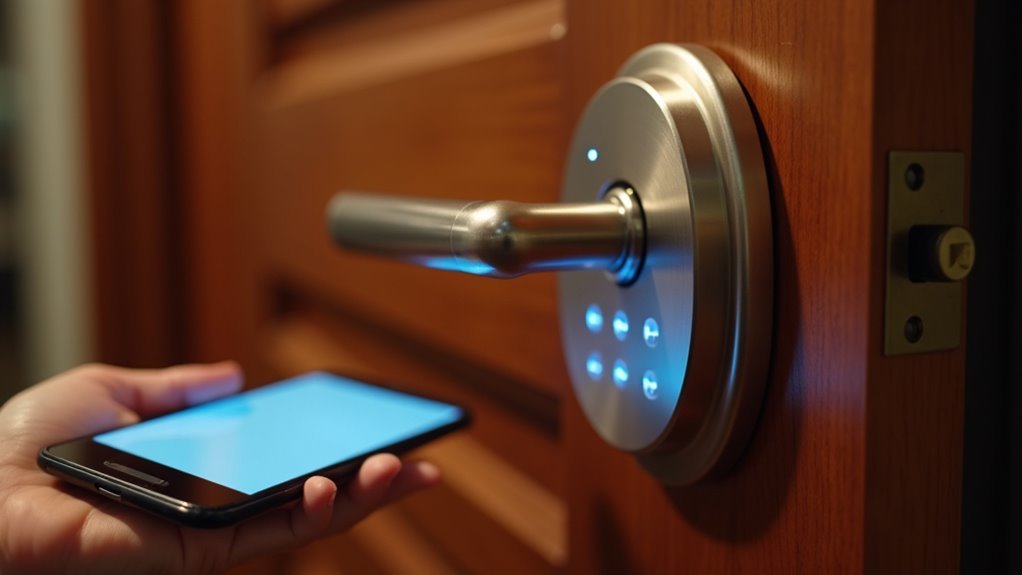
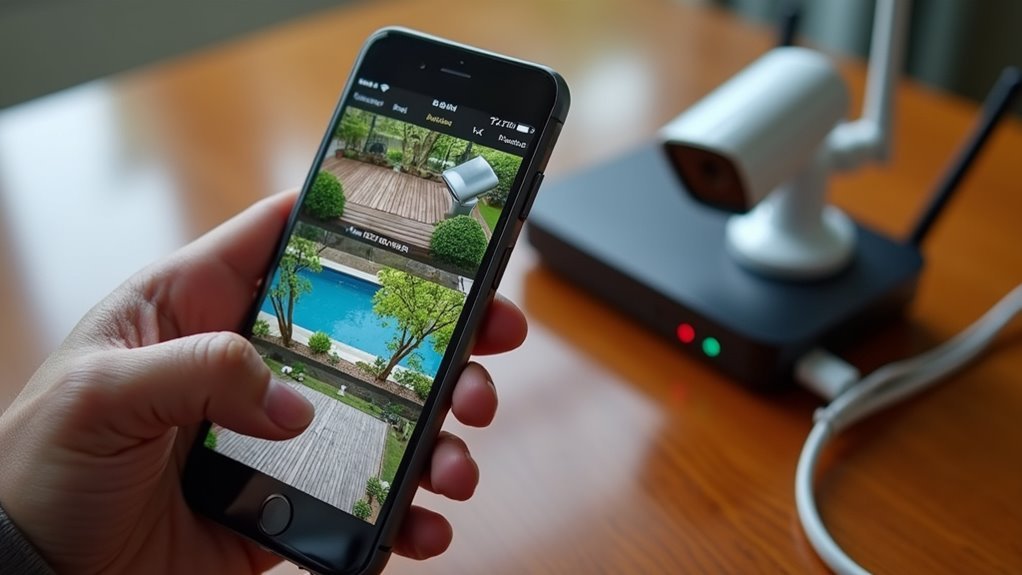
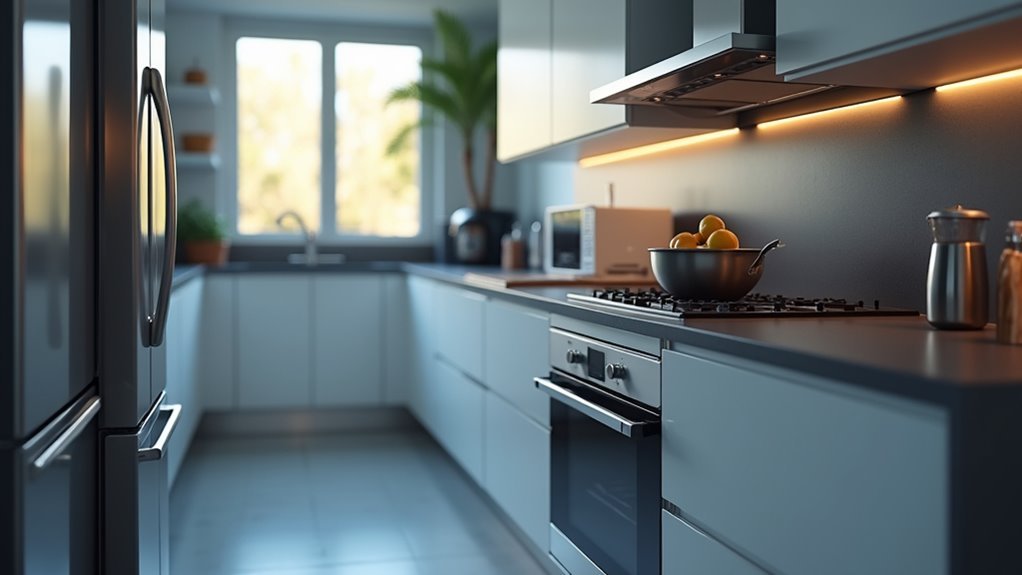
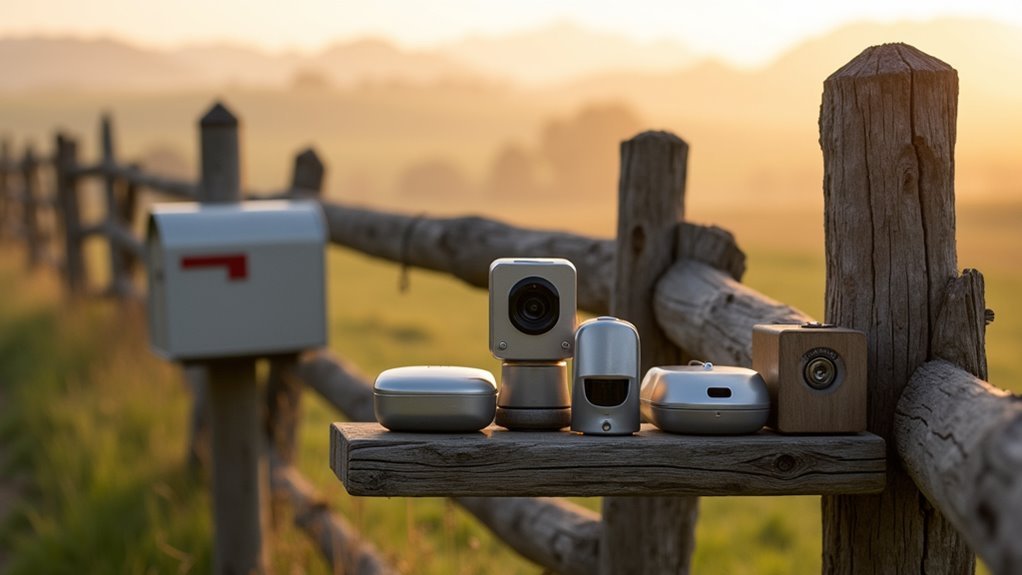
Leave a Reply